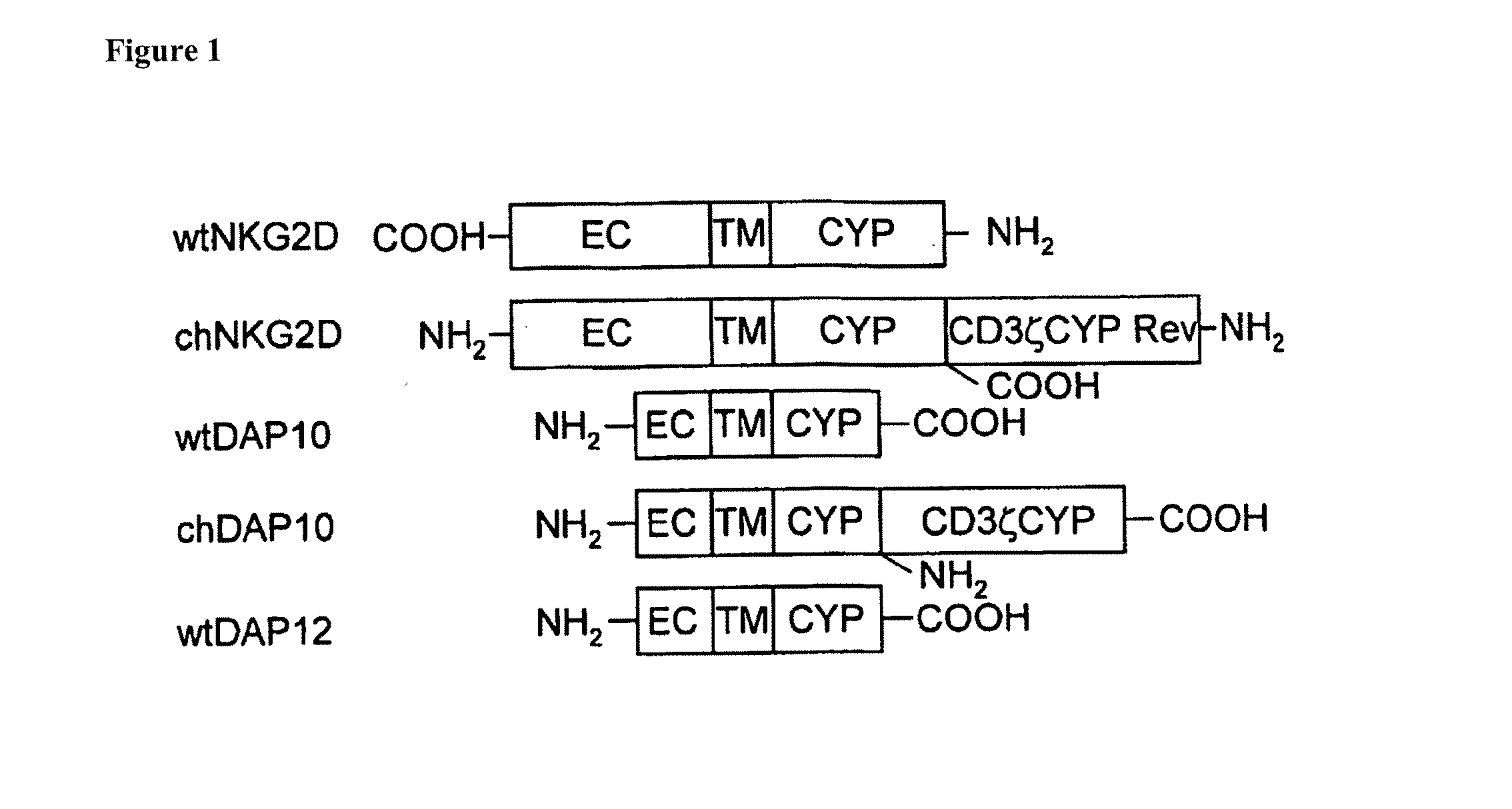T cell receptor-deficient t cell compositions
a technology of t cell receptors and compositions, applied in the field of t cell receptor-deficient t cells, can solve the problems of limiting the potential of immune cells to become, cancer continues to grow, and patients with advanced cancer may have gone through rounds of chemotherapy, so as to reduce or improve the effect of disease or prevent or treat diseas
- Summary
- Abstract
- Description
- Claims
- Application Information
AI Technical Summary
Benefits of technology
Problems solved by technology
Method used
Image
Examples
example 1
Production of T Cell Receptor (TCR)-Deficient T Cells
[0114]Minigenes are encoded on a retrovirus expression plasmid (e.g. pFB-neo or pSFG) containing 5′ and 3′ LTR sequences. The plasmids are packaged in a retroviral packaging cell line, such as PT67 or PG13, and viral particles are collected once the packaging cells have grown to confluence. T cells are then activated by PHA, anti-CD3, or anti-CD3 / 28 mAbs for 1 to 3 days in complete medium (or serum free medium) plus rIL-2 (25 U / ml), and T cells are transduced by spinoculation at 32° C. in the presence of retronectin or polybrene. After resting for some 5 to 7 hours, the cells are washed and placed in fresh medium plus IL-2 for 2 to 7 days. Cells are counted periodically to avoid excessive cell concentration (i.e., >2×106 cells / ml) and re-plated at 7×105 cells / ml. Selection medium to remove non-transduced T cells is optionally used after 2 days for a period of 3 to 5 days. Live cells are harvested by Lymphoprep™ (Sentinel, Milan, I...
example 2
Production of T Cell Receptor (TCR)-Deficient T Cells Expressing chNKG2D
[0118]In this example, simultaneous expression of a chNKG2D receptor and inhibition of endogenous TCR expression is performed. In this example, a murine chNKG2D receptor is used, composed of NKG2D in combination with a N-terminally attached CD3-zeta. The chNKG2D receptor is generated and expressed in murine T-cells. NKG2D is a type II protein, in which the N-terminus is located intracellularly (Raulet (2003) Nat. Rev. Immunol. 3:781-790), whereas the CD3-zeta chain is type I protein with the C-terminus in the cytoplasm (Weissman, et al. (1988) Proc. Natl. Acad. Sci. USA 85:9709-9713). To generate a chimeric NKG2D-CD3-zeta fusion protein, an initiation codon ATG is placed ahead of the coding sequence for the cytoplasmic region of the CD3-zeta chain (without a stop codon TAA) followed by a wild-type NKG2D gene. Upon expression, the orientation of the CD3-zeta portion is reversed inside the cells. The extracellular...
example 3
In Vivo Administration of T Cell Receptor (TCR)-Deficient T Cells Expressing chNKG2D
[0125]In this example, the TCR-deficient T cells expressing a murine chNKG2D receptor as produced in Example 2 are administered to mice to evaluate the in vivo therapeutic potential of said T cells on certain cancers. The chimeric NKG2D-bearing T cells (106) are co-injected with RMA / Rae-1β tumor cells (105) subcutaneously to C57BL / 6 mice. Chimeric NKG2D-bearing, TCR-deficient T cell-treated mice that are tumor-free or have tumor-inhibited growth of RMA / Rae-1β tumors after 30 days reflects therapeutic anti-cancer activity in these mice.
[0126]In a second and more stringent model, transduced T cells (107) are adoptively transferred i.v. into B6 mice one day before RMA / Rae-1β s.c. tumor inoculation in the right flank. Suppression of the growth of the RMA / Rae-1β tumors (s.c.) compared with control vector-modified T cells reflects therapeutic anti-cancer activity in these mice. As for toxicity of treatment...
PUM
| Property | Measurement | Unit |
|---|---|---|
| Angle | aaaaa | aaaaa |
| Angle | aaaaa | aaaaa |
| Angle | aaaaa | aaaaa |
Abstract
Description
Claims
Application Information
 Login to View More
Login to View More - R&D
- Intellectual Property
- Life Sciences
- Materials
- Tech Scout
- Unparalleled Data Quality
- Higher Quality Content
- 60% Fewer Hallucinations
Browse by: Latest US Patents, China's latest patents, Technical Efficacy Thesaurus, Application Domain, Technology Topic, Popular Technical Reports.
© 2025 PatSnap. All rights reserved.Legal|Privacy policy|Modern Slavery Act Transparency Statement|Sitemap|About US| Contact US: help@patsnap.com

